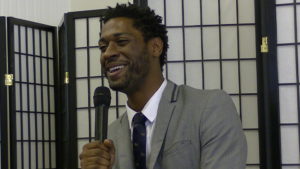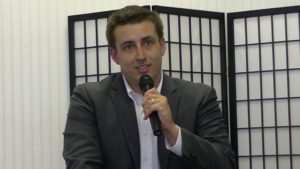This week on The Score – Will independent candidates for the state senate overcome the odds to win in November? Can a first-year college student take on the FDA and change federal policy? What can we make of Donald Trump’s challengers in the Republican presidential primaries?
http://bearingdrift.com/wp-content/uploads/TheScore_Sept28_FullHour.mp3 [1]This week’s guests are all younger than thirty years old but each one is aiming to have an impact on politics and policy.
We’ll start out talking to a couple of candidates for the Virginia General Assembly, then hear from the teenage co-founder of a non-profit advocacy group, and wrap up our conversation from last week about the 2020 presidential primary candidates.
Morrissey’s Rival
 First in line is Waylin Ross, who at twenty-nine years old is running for the Virginia General Assembly in the 16th State Senate district, which includes parts of Richmond and the entire city of Petersburg, which is Waylin’s home town. The seat is open but he is an independent in a race against former Delegate Joe Morrissey, whose notoriety and bank account give him an edge. Or do they?
First in line is Waylin Ross, who at twenty-nine years old is running for the Virginia General Assembly in the 16th State Senate district, which includes parts of Richmond and the entire city of Petersburg, which is Waylin’s home town. The seat is open but he is an independent in a race against former Delegate Joe Morrissey, whose notoriety and bank account give him an edge. Or do they?
I spoke to Waylin after a candidates’ forum [2] in Charlottesville on September 24th. One of the questions I asked was an old stand-by for me: Among current politicians with whom you disagree on the issues, is there anyone you admire or respect? His answer was former Ohio Governor John Kasich.
The Ross campaign web site is here [3]. Waylin has no active Twitter account but you can find him on LinkedIn [4] and Facebook [5].
Harding Returns
 Up next, another independent candidate for the General Assembly is Elliott Harding, who has been a guest on The Score on several previous occasions (July 28, 2019 [6]; November 3, 2019 [7]; September 22, 2018 [8]; and March 17, 2018 [9]). Also 29, he is challenging incumbent Democrat Creigh Deeds [10] in the bizarrely-shaped 25th state senate district, which stretches from the West Virginia border to Charlottesville and Albemarle County — but you can’t drive through it from end to end without crossing into a neighboring district.
Up next, another independent candidate for the General Assembly is Elliott Harding, who has been a guest on The Score on several previous occasions (July 28, 2019 [6]; November 3, 2019 [7]; September 22, 2018 [8]; and March 17, 2018 [9]). Also 29, he is challenging incumbent Democrat Creigh Deeds [10] in the bizarrely-shaped 25th state senate district, which stretches from the West Virginia border to Charlottesville and Albemarle County — but you can’t drive through it from end to end without crossing into a neighboring district.
Among other things, I asked Elliott about the qualities that independent candidates bring to politics and about some of the issues covered in the forum with Waylin Ross, such as drug law reform.
Follow Elliott on Twitter at @Harding4VA [11].
Challenging the FDA
 Whether it’s because he’s unusually ambitious, passionately focused, or precociously media savvy, first-year University of Virginia student Austin Houck has been getting a lot of press attention for a project he launched this past summer with friends from West Potomac High School.
Whether it’s because he’s unusually ambitious, passionately focused, or precociously media savvy, first-year University of Virginia student Austin Houck has been getting a lot of press attention for a project he launched this past summer with friends from West Potomac High School.
They started a non-profit called Homoglobin [12] with the goal of ending the Food and Drug Administration’s 30-year-old policy that effectively bans gay men from donating blood. (Sample media clips: The Daily Progress [13], CBS 19 [14], NBC29 [15], Cavalier Daily [16], Instinct Magazine [17], Houston Chronicle [18], WIFR-TV [19], Kaiser Health News [20].)
I met Austin on UVA’s Grounds last Wednesday and asked him to explain what Homoglobin is and what it does. I also inquired about the organization’s origins and what it takes to create a 501(c)(4) non-profit advocacy corporation.
Austin is on Twitter as @AustinHouckVA [21] while Homoglobin tweets from @homo_globin [22].
As an aside, after our conversation, I came away thinking I had been talking to a future recipient of a MacArthur Foundation fellowship [23]. Check back in twenty years.
Primary Challengers
 Last week on The Score [24], we had a wide-ranging conversation with Young Voices [25] contributor and Georgetown University law student Ethan Lamb [26] about the Democratic presidential candidates.
Last week on The Score [24], we had a wide-ranging conversation with Young Voices [25] contributor and Georgetown University law student Ethan Lamb [26] about the Democratic presidential candidates.
This week, we finish up with a look at the Republican challengers to President Trump, including former Massachusetts Governor Bill Weld, former South Carolina Governor Mark Sanford, and former Illinois Congressman Joe Walsh, and possible Libertarian Party candidates. (Will Weld or Sanford switch parties in time for the LP nominating convention at the end of May? What about newly independent, formerly GOP Michigan Congressman Justin Amash?)
Our interview took place before revelations emerged about Donald Trump’s July 25 phone call with Ukrainian President Volodymyr Zelenskyy and the fallout from that on Capitol Hill, so don’t expect speculation this week about how impeachment might affect the GOP primaries in the states that are still having nomination contests. That is, however, a topic to explore on future episodes of The Score.
Look for Ethan on Twitter at @realethanlamb [27].
Next week’s episode remains a work-in-progress, but I’m hoping to see the return of The Score’s arts and culture critic, Tim Hulsey, with a review of the latest Pulitzer Prize winner for drama. Anticipate sizzle and sparks.